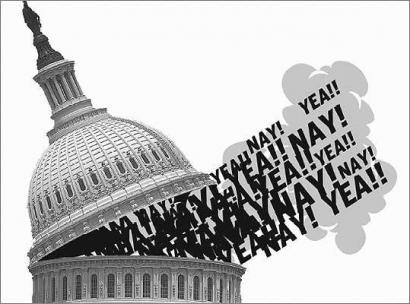...
Making public policy is like making anything else. Above all, quality matters. In legislation, it's really not important who voted for it, or against it, how many pages it fills or how long it took to produce. The only thing that really matters is that it perform it's intended function without introducing a new set of inefficiencies, and that it do so in a cost effective and timely fashion. So why is it considered so important that public policy be made in a 'bipartisan' manner?
It's important to view this question in the current context. Over the preceding years and decades, the idea behind legislation and public policy was much like the idea behind an adversarial legal system. You would bring in voices from both sides of an issue, and have them work out a solution that was acceptable to all. This made certain you wouldn't end up with something extreme or unfair to a fault. And as long as the politicians and legislators shared the same goal of governing well, this system did work. It tended to move slowly, but it prevented wild swings in political, economic or social direction. This process in no way guaranteed good policy, but it functioned fairly well in preventing exceedingly bad policy.
Today, all discussions of politics and public policy in America must be viewed through a cracked lens: Our system has broken down under the strain of an increasingly polarized debate and the willingness of the participants to operate as desperate players in a zero-sum game of survival rather than statesmen seeking to improve the lives and well being of their constituents. Indeed, the very goal has shifted, from a desire to govern well to a desire to have the power to govern. The goal is no longer to improve the lives and well being of the governed, but rather increase the power and wealth of the party. When the rhetoric went from a staid "my opponent is wrong" to an apocalyptic "my opponent is an America - hating socialist trying to destroy the America we know and love" the opportunities for reasonable discussion are at an end.
Interestingly, you'll notice no outcry for bipartisanship in Parliamentary governments. That's because whoever wins the election gets to implement their agenda, and the other side is seldom even asked for input. One may agree or disagree with the function or general tone of any particular policy, but it is rarely heard that Parliamentary democracies by their very nature produce bad or wildly extreme legislation. When you stop and think about it, any belief that legislation must have bipartisan support in order to have political legitimacy is completely unfounded, and indeed, in the context of the twentyfirst century American political system merely gives an unprincipled opposition another tool with which to obstruct real attempts at governance.
While some of these demands for bipartisanship in the the media may well reflect an honest, if misguided desire to return to serious and effective governance, many of them seem merely intended to delegitimize a Democratic legislative agenda they deem too liberal. But any serious effort to improve the legislative product coming from Capitol Hill must address the various procedural impediments to good policy. In fact, at this point we should be demanding less bipartisan activity, not more. At this point, it only seems to slow down the process, water down the legislation and create gaps and loopholes that greatly reduce the effectiveness of the finished bill. If some of the arbitrary and nonsensical procedural veto points were eliminated, a smaller group of public servants genuinely interested in governing might well produce better, more effective and less costly public policy that accomplishes important goals.
...
Subscribe to:
Post Comments (Atom)

No.
ReplyDeleteI'll use my own David Broder shorter:
Bipartisanship is when corporate-owned Democratic Senators (aka the blessed 'moderates') join with Republicans to pass whatever short-sighted, unabashedly greedy, and ultimately disastrous legislation the Republicans dream up.
~
Doesn't matter HOW you choose to define it, somebody who claims it's important needs to offer a coherent and logically consistent explanation for why they feel it matters in the first place. Because at this point it's just a vague buzzword, like when a teabagger says 'liberty' or 'tyranny' or 'socialism'...
ReplyDeleteI remember when "the rule of law" was an important term, back in the 90s.
ReplyDeleteJust a year later, it didn't mean a thing.
~
I'm actually old enough to remember when you could be a liberal and a patriotic american AT THE SAME TIME!
ReplyDelete